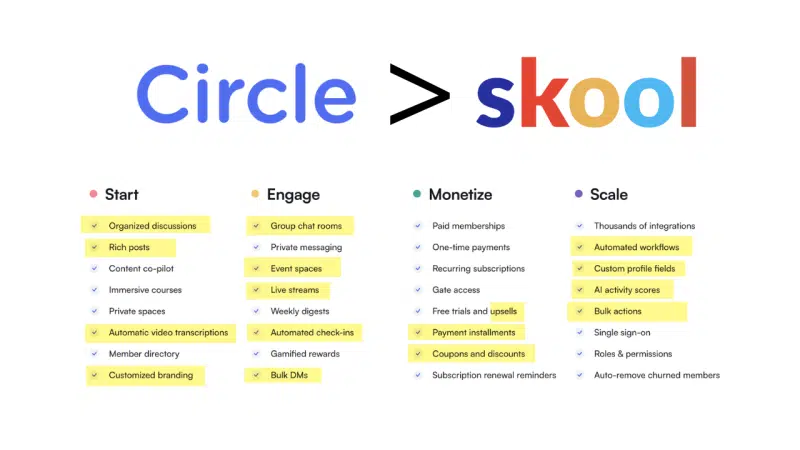"Should I use Skool or Circle for my community?"
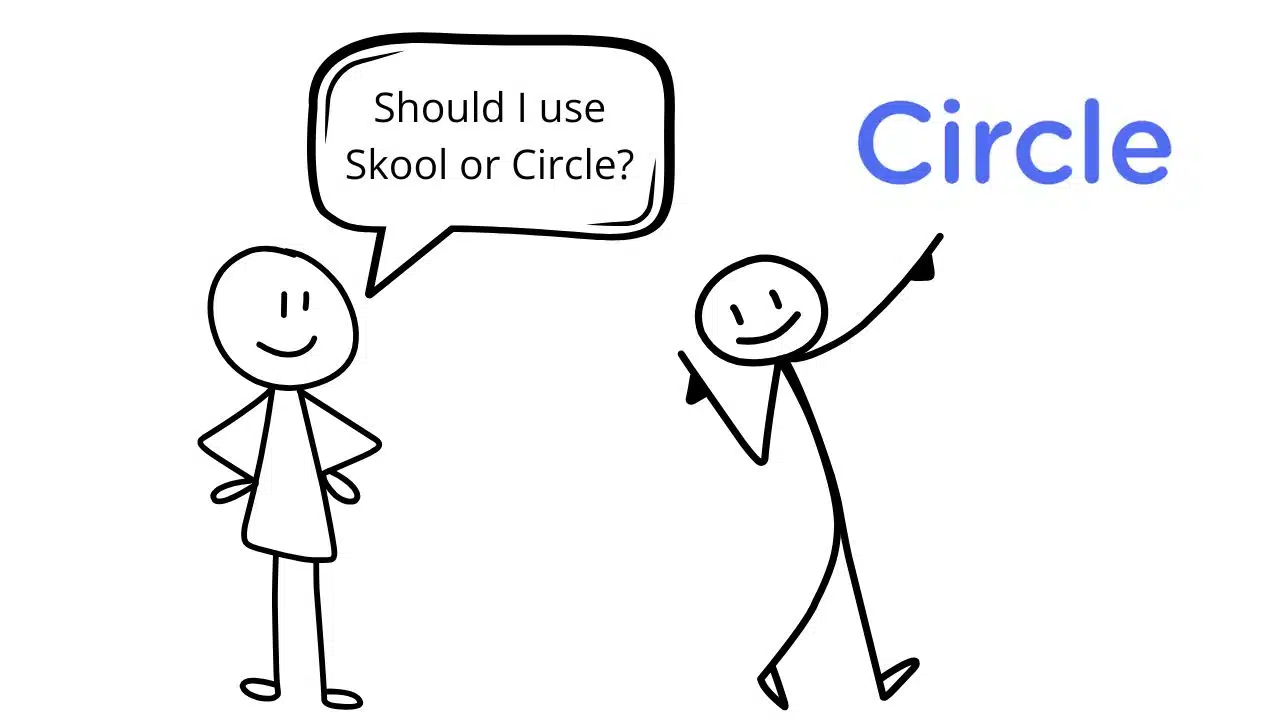
I've been asked this a handful of times this year already.
As someone who actively uses both Skool and Circle, I am uniquely qualified to accurately answer this question.
Why I use both is a long story. I started with Circle way back in 2017 and cancelled in about 2022 to just use Facebook for my community. Recently I moved everything to Skool and now have two paid communities hosted there.
This year though, I teamed up with a friend to create a high ticket community that was targeted at medical professionals. Wanting to make sure we used the most professional, effective option, I revisited Circle.
After a few minutes of reviewing all of the updates they had made since I left, I signed up and paid for a year.
Honestly, as I looked more into the different features, I kindof started to get mad. I had no idea how many things I was leaving on the table by using Skool and not Circle.
So, I decided I needed to share this with everyone, because I've been back in forth on which I've recommended to others.
Let's start by listing what both platforms can do for you and then I'll explain why Circle does more and does it all better.
Note on Pricing: Features will be compared between the basic plan of Circle to the basic (and only) Skool plan. Circle is $89/month (paid annually) and Skool is $99/month (no annual). Circle can do even more things that Skool cannot when you upgrade to their higher tiers, but even the base tier on Circle is more robust than Skool's basic plan. I use the base plan on Circle and that is what will be referenced in this article.
Note on My Affiliation: This is not a sponsored post but I am an affiliate for both Skool and Circle. Skool actually pays me more than Circle does, but I think it's fair that you know that both (might) pay me if you purchase through either of the links shared in this post.
Skool vs. Circle: What You'll Get with Skool and Circle
Here is what you'll get if you purchase either membership program.
- Unlimited members.
- Course areas
- Community feed
- Gamification (reward members for engagement)
- Event scheduling
- Upsells
- Free and paid pricing options for members
- Zapier integrations (fill in technology gaps with your other softwares
- Affiliate programs
- Email collection
That is the heart of both programs. There are other features, but these are the nucleus.
Why I Prefer Circle Over Skool
The short answer is simply that Circle has important features that Skool lacks, allows for more customization and does that while being more affordable overall.
Don't let the tier pricing mislead. If cost is your primary concern, Circle is actually the more cost effective decision.
This is because Circle has many functions natively supported in their platform that you will need to buy separately if you choose Skool.
Here are all of the key ways Circle outperforms Skool.
Note: This article started out as "5 features Circle has that Skool doesn't" but as I started digging deeper, I continued to find more and more things that Skool lacks. It got pretty crazy actually.
Features |  |  | Notes |
|---|---|---|---|
#1 Built in Live Streams & Webinars | Circle saves me $240/year on Streamyard. | ||
#2 Custom Domains | All Skool communites are "skool.com/your-name" | ||
#3 Video Hosting | Circle saves me $500+ per year in video hosting costs through Vimeo. | ||
#4 Layout Options | Skool is "Feed" style only. | ||
#5 Rich Text Options | Skool allows for almost zero text customization in posts. | ||
#6 Group Chats | Skool allows you to direct message members, but only one at a time. | ||
#7 Comments on Courses | Skool doesn't allow students to ask questions directly on course content. Circle does. | ||
#8 Coupons and Discounts | Skool has no discount system. Moving members to different pricing is impossible without cancelling. | ||
#9 Automated Check-Ins | Circle lets you message members on a schedule to make sure they are on pace to succeed. | ||
#10 Full Email Marketing Suite | Circle offers an email marketing solution for your first 100 contacts and very affordable after. | ||
#11 Customizable Branding | Skool offers minimal customization but Circle allows for a fully customized color palete. | ||
#12 Multiple Pricing Tiers | Skool allows you to offer access on a monthly or annual basis but you cannot have multiple tiers. | ||
#13 Robust Member Directory | Skool has a member directory, but they might as well not since it's so basic. Skool provides a true, robust member directory with valuable filters and information. | ||
#14 SSO (Single Sign On) | Circle allows users to sign in with Facebook, Twitter and more. | ||
#15 AI Integrations | Circle offers several powerful AI tools such as their feed summarizer that breaks down the latest content into concise paragraphs for members. |
Circle Has Custom Domains, Skool Uses "Skool.com" Domains Only
Skool refuses to let you host your community on your own domain. All Skool communities are formatted like Skool.com/your-community.
Skool originally wouldn't even let you change the slug (the part after Skool.com) but they did recently add the ability to purchase a new one for $100.

With Circle, you can actually host your community as a subdomain on your own website.
For example, the community for englishlikeanative.co.uk/ is https://community.englishlikeanative.co.uk/.
You can also do a custom root domain. This allows you to have your community show as something like www.yourcommunity.com.

It's up to you if you think that is better than a skool.com/your-group domain, but I like having the option.
Honestly, the brevity of my Skool domain skool.com/eam is pretty nice, so I don't have complaints their.
Also, if you really like the idea of your community being hosted on your website, you can embed your Circle community inside of any website you own with some basic iFrame code snippets.
Circle Allows for Multiple Monthly Pricing Tiers, Skool Has Just One
This is a massive oversight on Skool's part. You have to set one subscription rate for everyone and you can't customize the access for different tier levels.
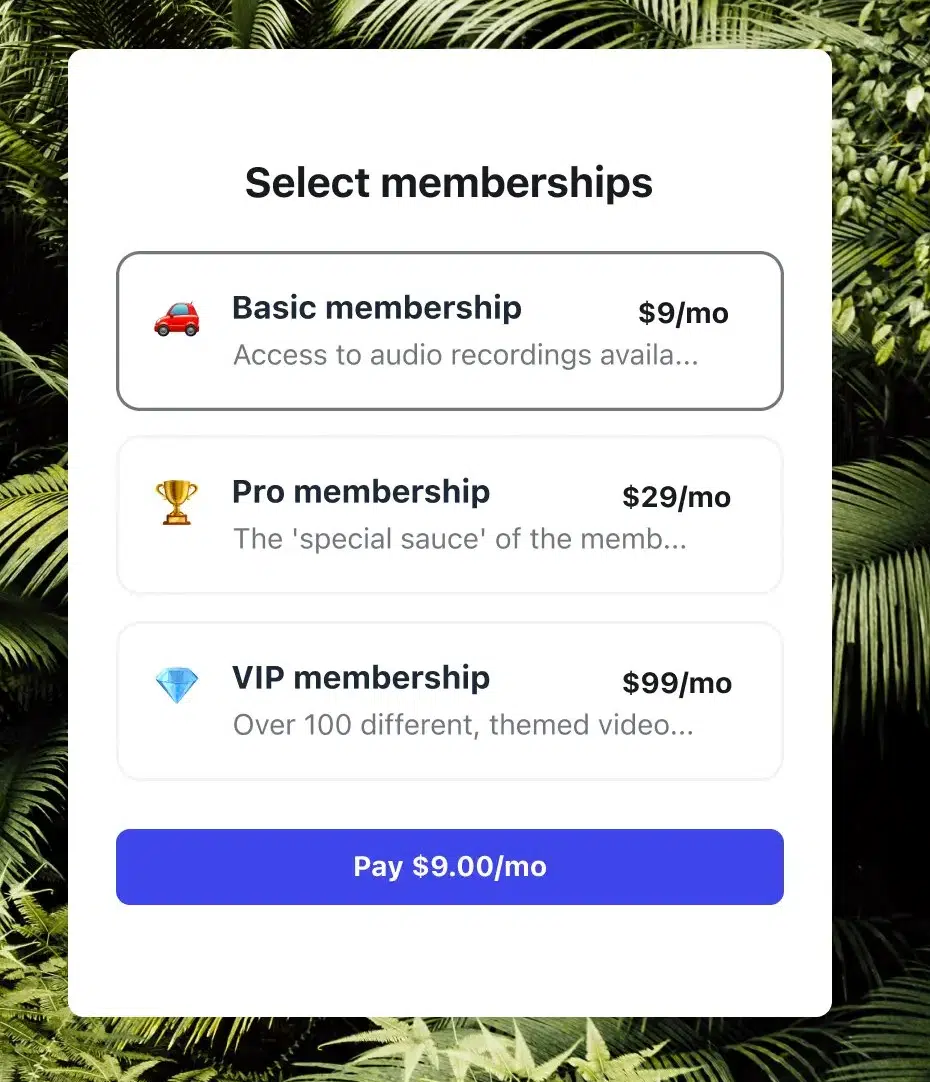
Circle Lets You Set Different Pricing Tiers
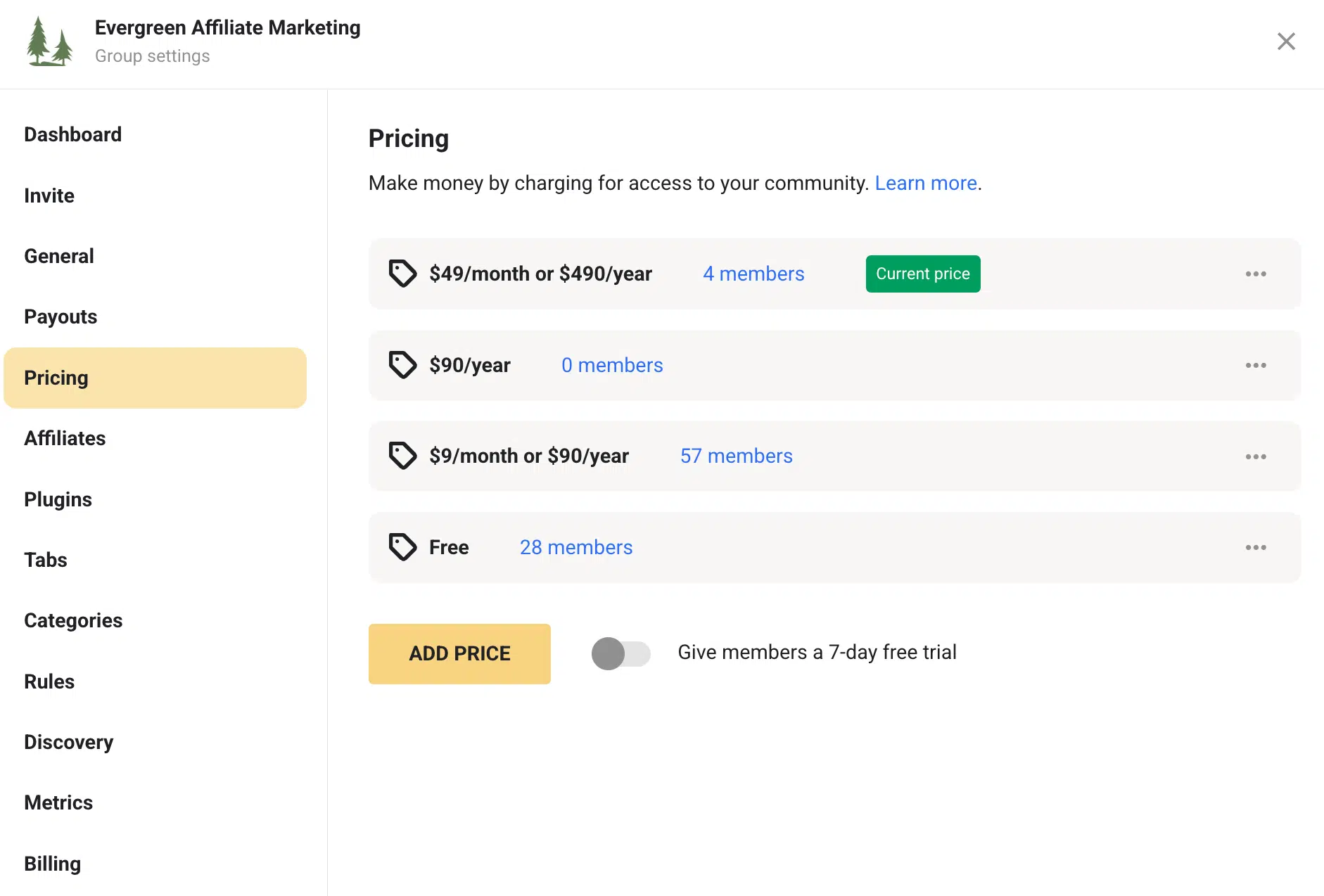
Skool Doesn't Allow for Different Pricing Tiers
Circle Has Video Hosting, Skool Makes You Host Them Somewhere Else
Skool requires external video hosting like YouTube or Vimeo.
Circle allows you to upload videos directly and host them without a 3rd party tool. Also, if you prefer to use Vimeo or YouTube, you can still do that in Circle.
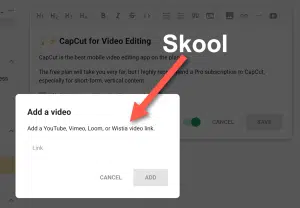
Skool requires 3rd parties for hosting.
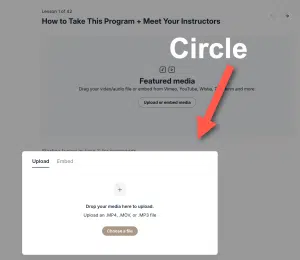
Circle has built in video hosting.
Circle Has Rich Text Posts, Skool Has One Type of Text
It's not the biggest need, but it's frustrating that Skool doesn't allow you to format text in your posts.
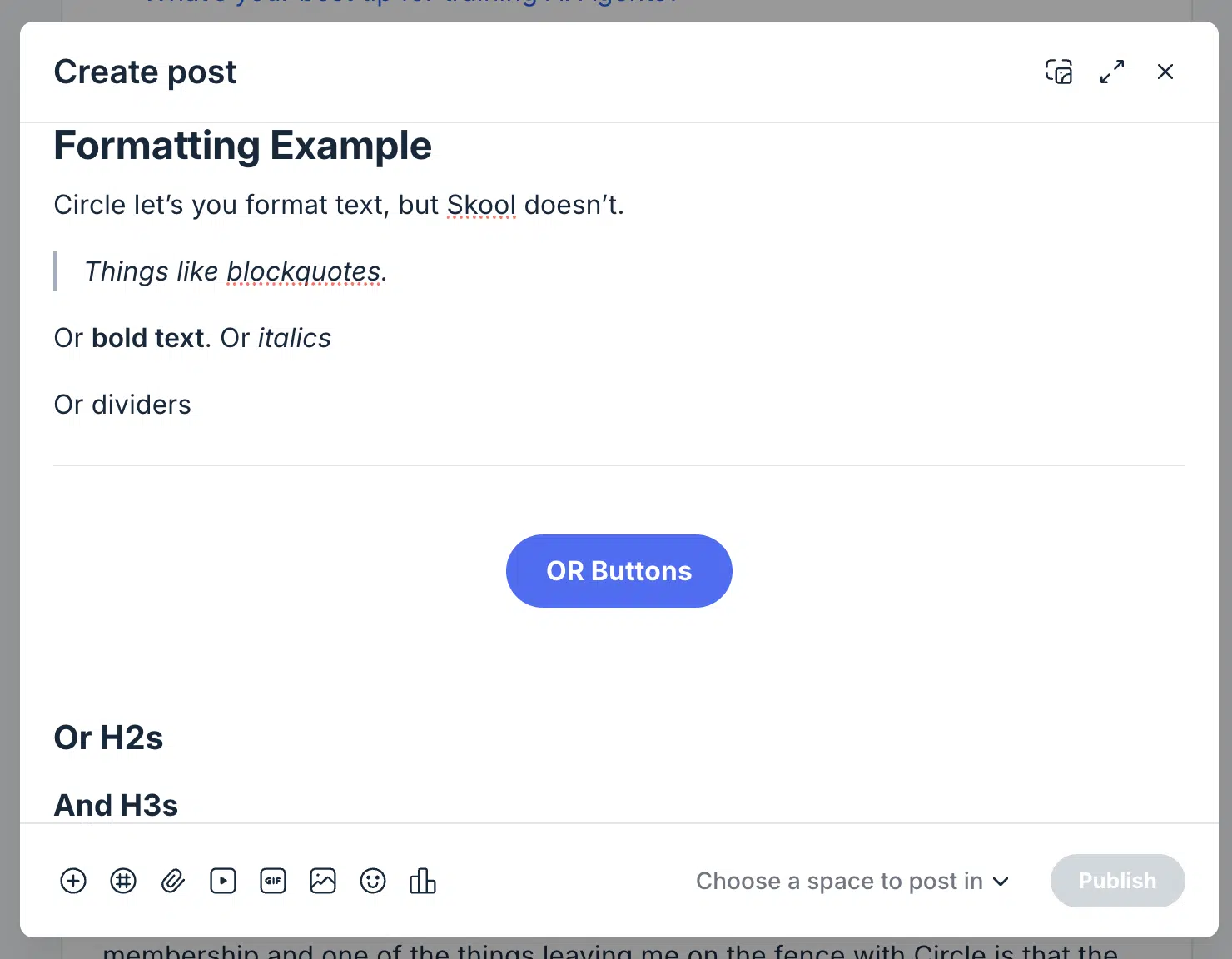
You can format inside of courses with more control, but not on regular posts.
Circle Has Multiple Layout Options, Skool Has One
Skool has one layout style and it is kind of lame.
Circle let's you choose from feed, list or card style layouts.

You can make beautiful photo style spaces in Circle that you could never make in Skool, like this one.
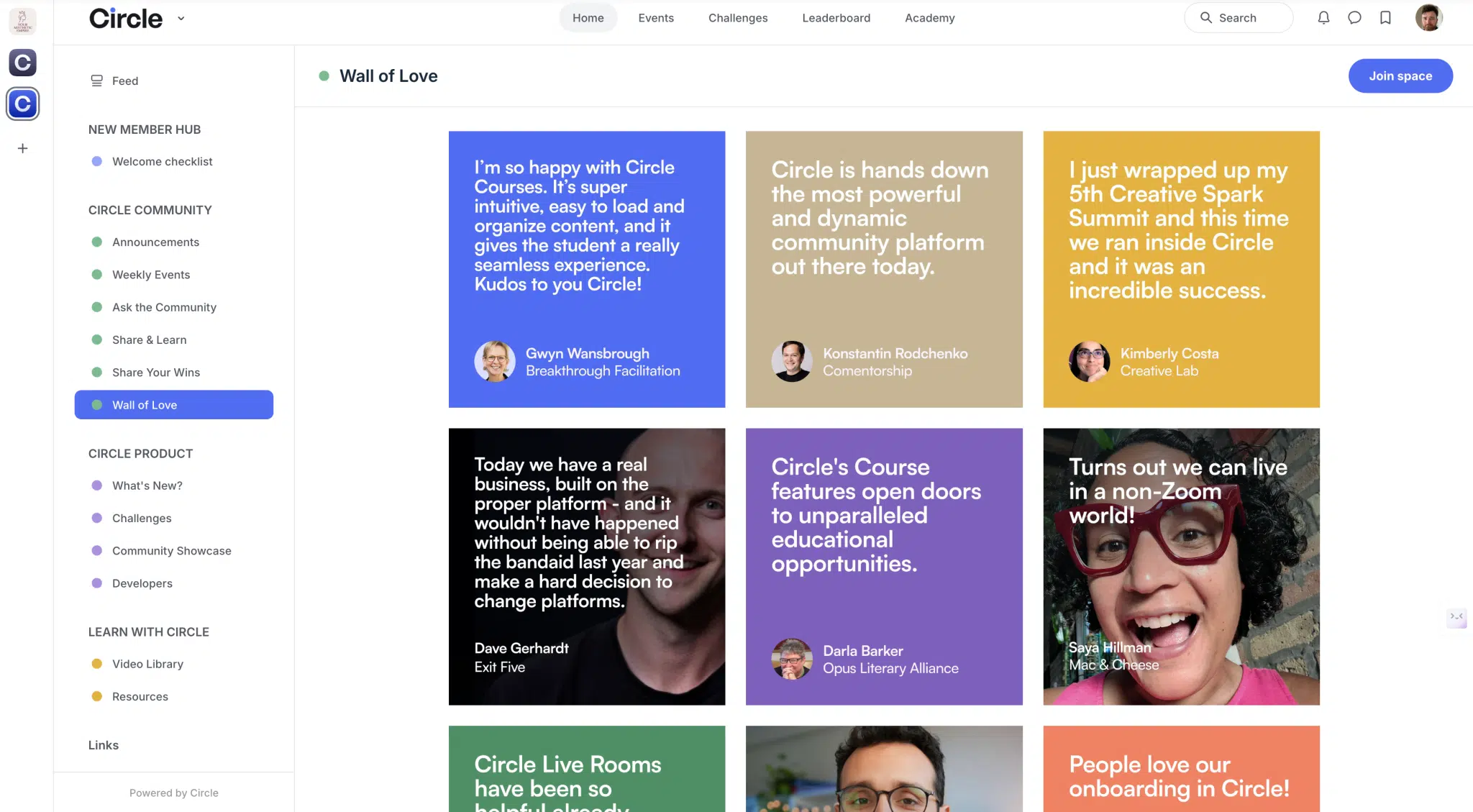
Example of a page design you could never make in Skool that you can make in Circle.
Circle Has Powerful AI Tools, Skool Doesn't Have Any
Circle has integrated AI throughout their program, even on the basic tier.
For instance, members can can use Circle's built in AI feature to summarize all of the latest content inside of your community.
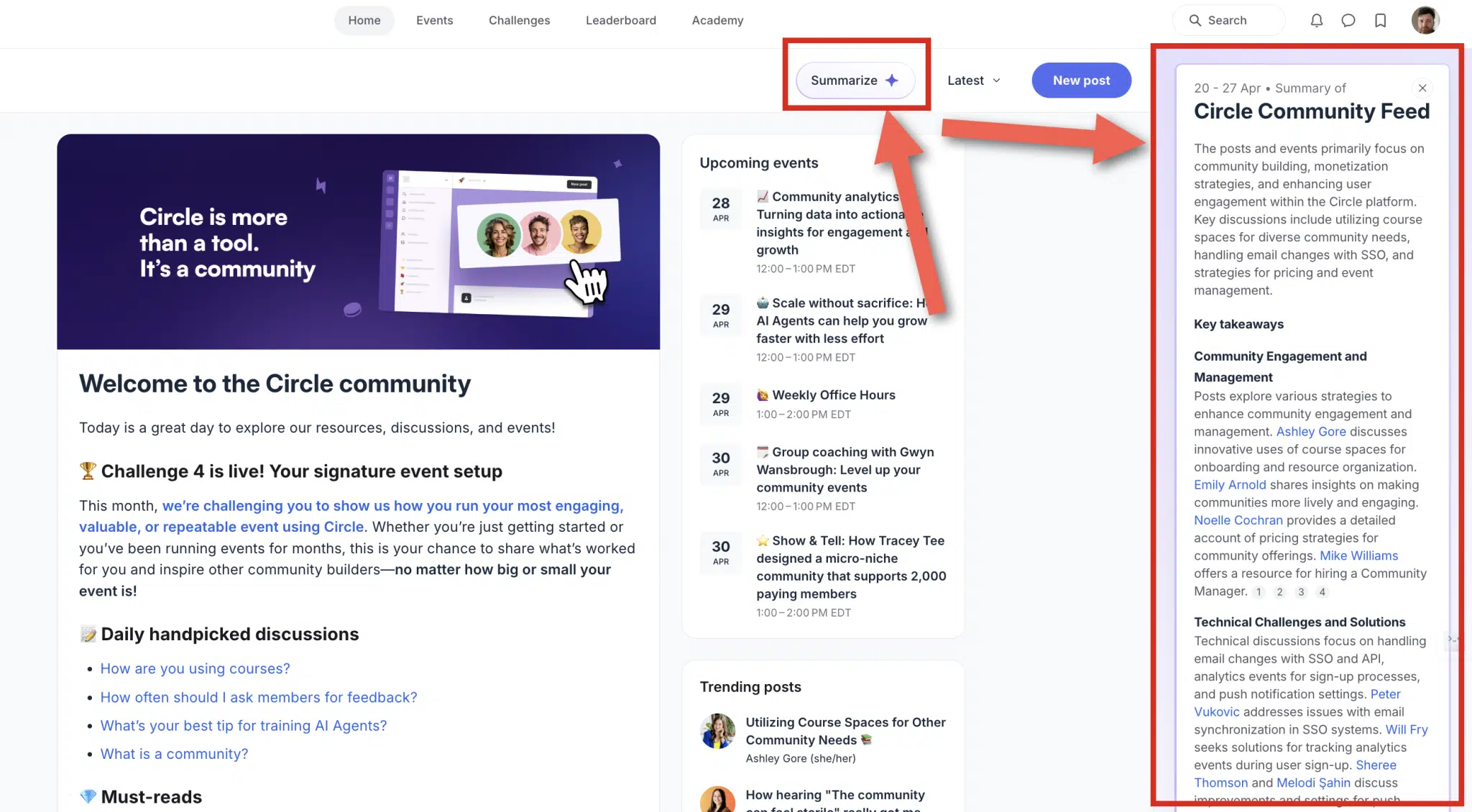
Other things like instant video transcriptions and AI content generators (a premium feature not on the basic plan) are beyond impressive.
Circle Has Integrated Live Streams, Skool Requires a 3rd Party
This is arguably the biggest benefit of Circle that Skool doesn't have. You can host live streams, Q+As and coaching calls inside of Circle without any additional cost or taking your members off of Skool.

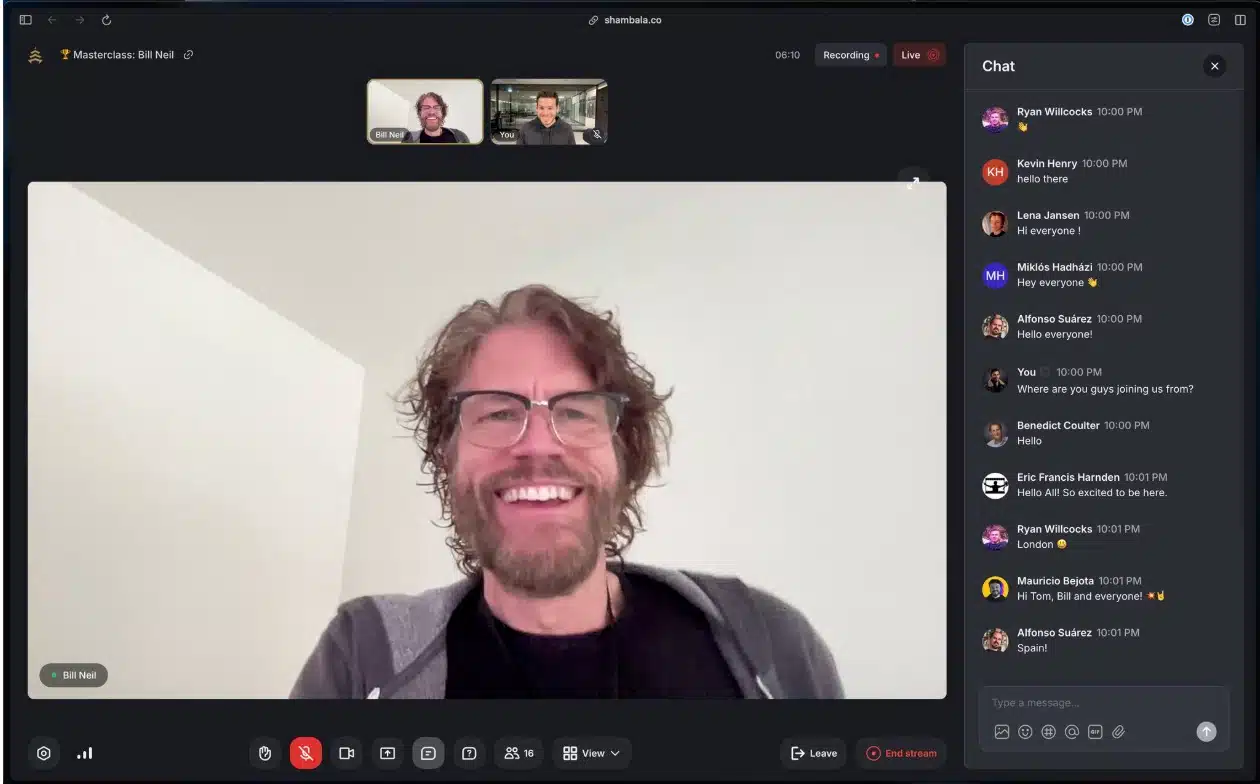
Events in Skool require a 3rd party solution like Streamyard connected to YouTube or Zoom to function.
Circle Offers Emails and Automations, Skool Lets You Send 1 Email Every 3 Days and Has Almost No Automations
Free for your first 100 contacts and then for an extremely low rate beyond that, Circle allows its users to manage their entire CRM and email marketing inside of Circle.
You can leverage their email software as well to do things like send email reminders when a webinar is about to start or send a specific message to a member once they've unlocked a new course area.
You can send an email to all members inside of your Skool group once every 72 hours, but that is a farcry from full control and the ability to email whatever and whenever you'd like. The email you send also needs to be a post inside of your community, so it is not at all the same as a true email broadcast.
Circle Lets You Direct Message All Members at Once, Skool Lets You Message One at a Time
Circle lets you message all members at once, whereas Skool allows one on one messaging only.
Furthermore, you can segment your audience with Circle, so the direct messages you send can be even more powerful.
For instance, you can message everyone in your community that doesn't have access to your premium course area and offer them a limited time discount.
Circle Lets Students Comment on Course Content, Skool Doesn't
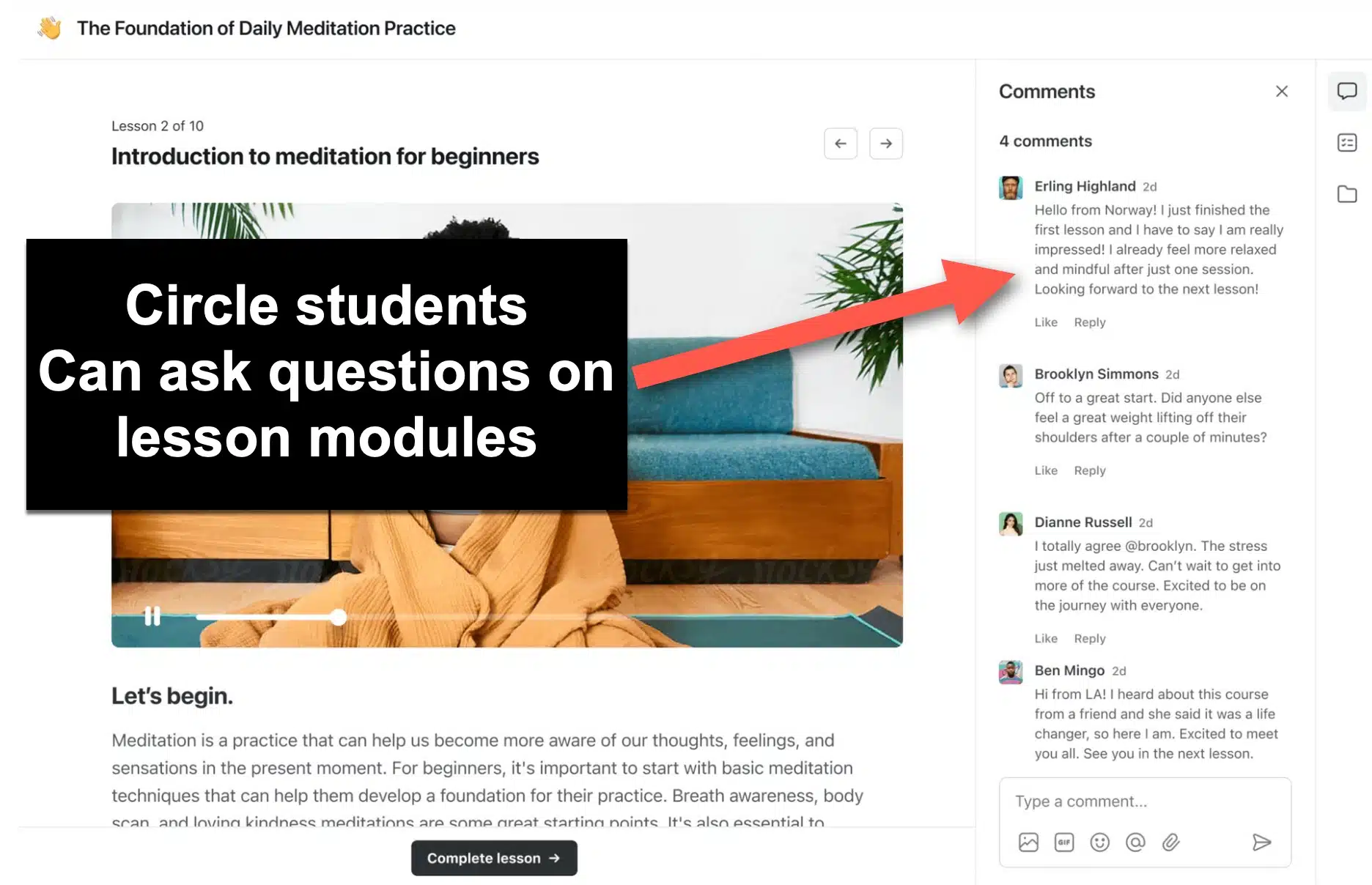
Circle Offers Spaces for Conversations, Skool Is Just One Thread
Skool is just one big conversation with no segmentation.
Currently, I have 4 paid communities that each have their own separate WhatsApp chat because we weren't using Circle when we launched.
This could have been done much more easily had we used Circle from the beginning.
Circles Lets You Use Coupons and Discounts, Skool Doesn't
Special offers are a marketing super power. Skool clips their user's wings by not allowing them.
Circle Lets You Customize Your Branding, Skool Barely Does Any
Every Skool community looks nearly identical to every other community.
Here are my two communities for reference...
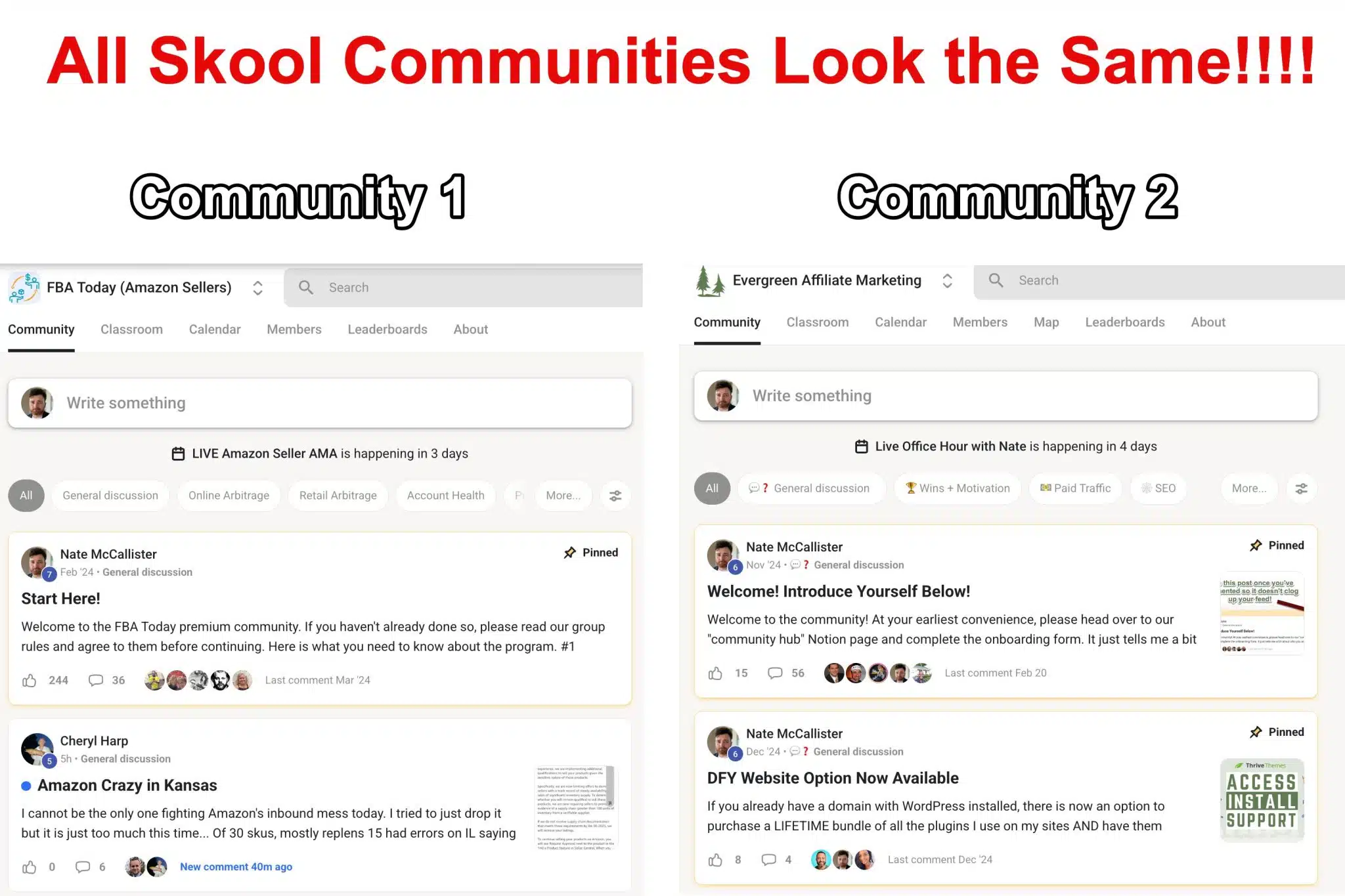
Circle, on the other hand, let's your community stand out with much deeper customization options.
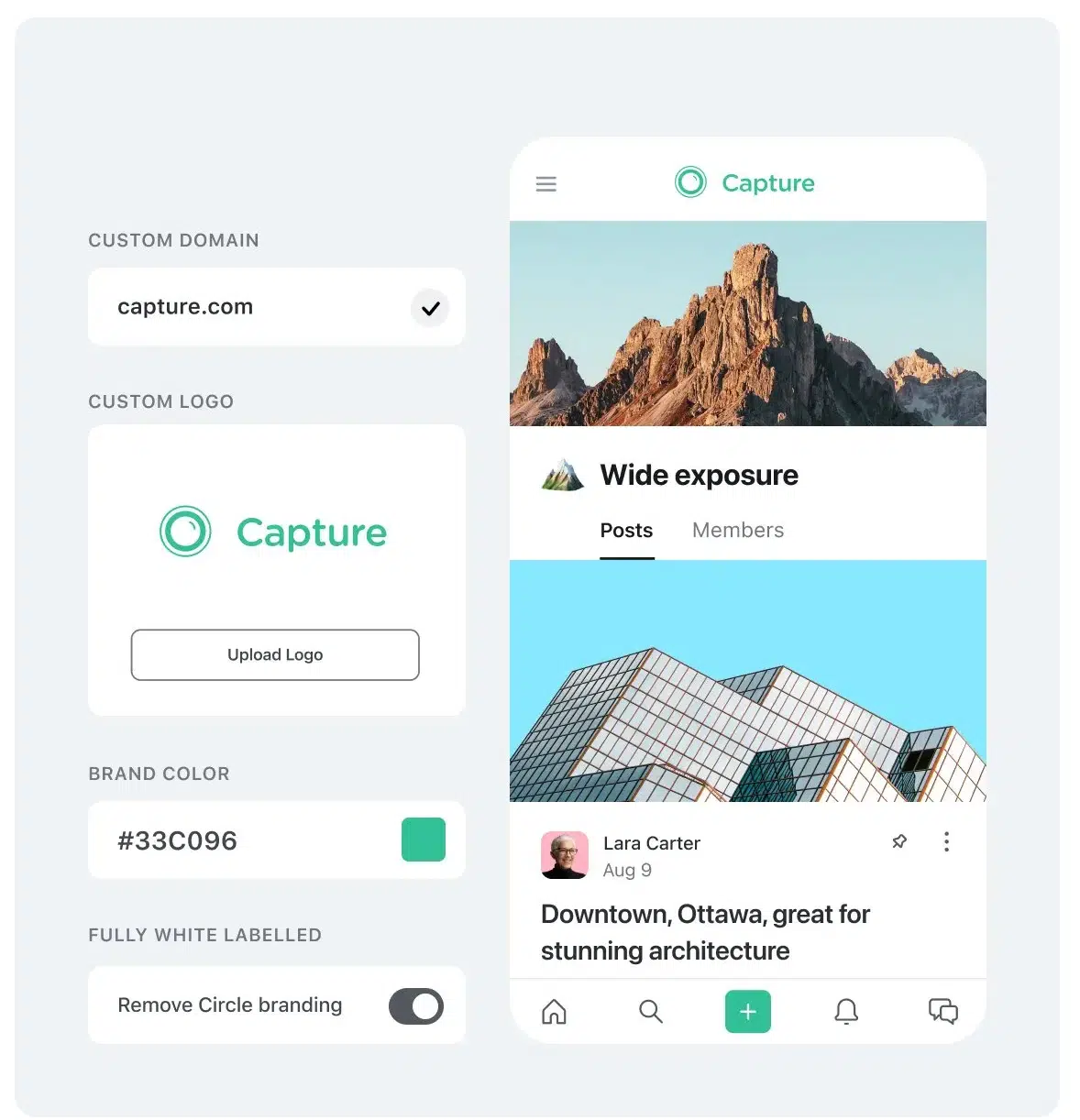
Circle Has Customizable Gamification, Skool Doesn't Let You Change It
Although both Circle and Skool offer gamification, Skool has a fixed formula for how much activity unlocks each tier.
This gets crazy because the highest tiers are nearly impossible to reach.
Circle lets you change how many "points" are required to level up.


Circle Has a Robust Member Directory, Skool Has a Basic One
Skool shows your members but the information provided is minimal.
Circle provides a beautiful directory of your members that is easy to navigate.
You can also add customized fields (however that is not available on the basic plan, it requires a $49/month add on or an upgrade to business or higher).
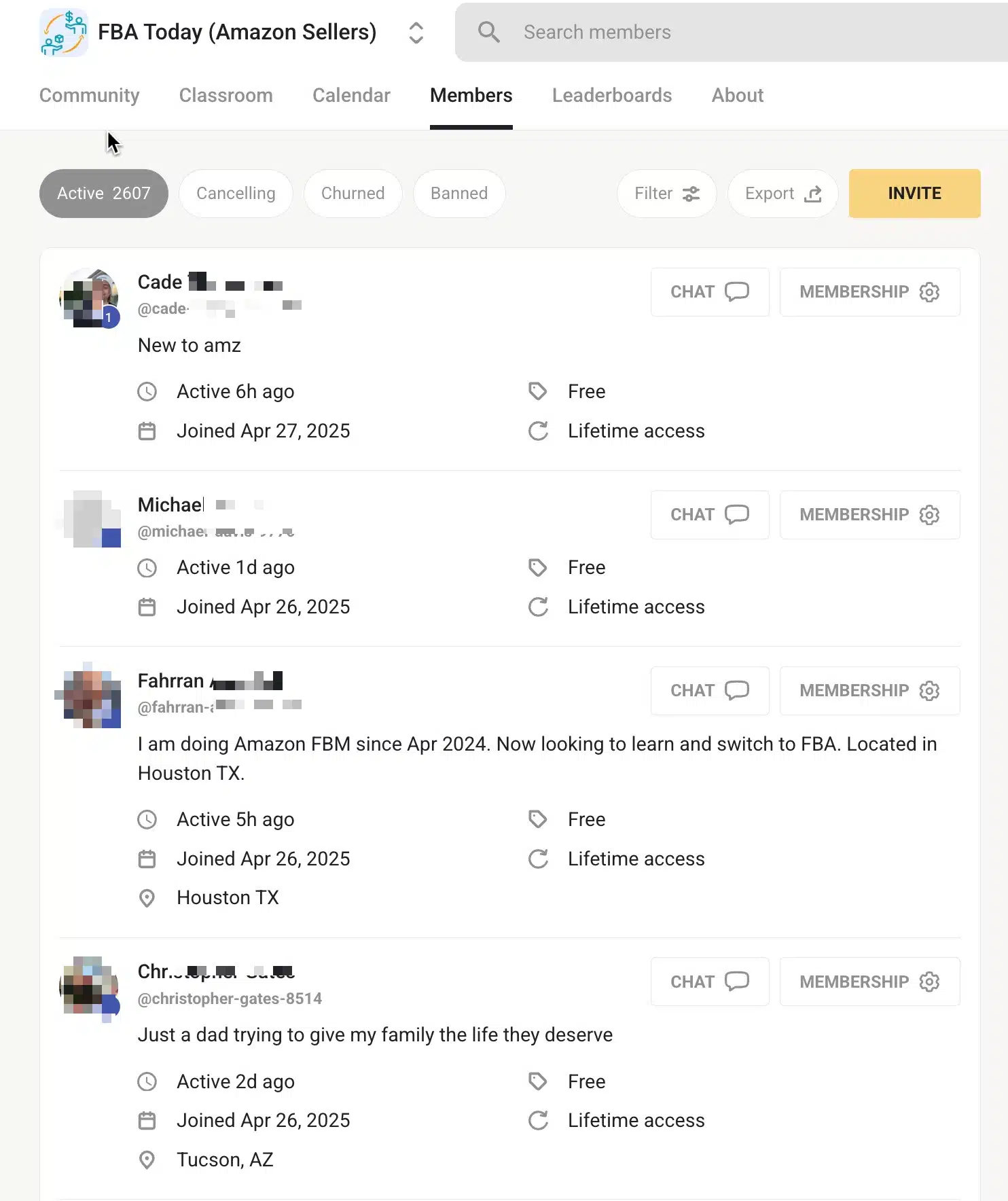
Skool member directory.

Circle member directory.
The Three Ways Skool Is Better Than Cirlce
Skool is better than Circle in just two ways.
- Their community discovery feature. Skool makes their communities publicly visible in a directory (although you do have the option to turn it off). How effective this is up for debate, but there is no denying more free visibility is always better. The downside is that this leads to a massive influx of spam requests to free groups, but paid groups see no issues with this.
- Skool is less confusing. Part of Circle's value is in its minimalism. "Less is more," if you're just trying to get a group up and running as quickly as possible. However, Circle is only marginally more difficult to set up and the returns are worth it.
- Skool transaction fees are lower than Circle on basic plans. Circle will seem to have lower transaction fees on the service (2% on the basic plan vs. 2.9% on Skool or 3.9% for charges over $900) but Circle then also charges Stripe fees on top of these. Skool doesn't. If you have one of the higher tier plans of Circle that charge lower transaction rates (1% or 0.5%) you will end up paying about the same or slightly less than Skool, even after Stripe fees.
Besides these features, all Skool does better than Circle is their own marketing.
Video Version of This Post
I know some of you prefer video!
Conclusion
Don't get me wrong, these are both fantastic softwares, but Circle is the clear winner. Skool would be fantastic if it weren't for Circle beating it in nearly every aspect (even price when you really crunch the numbers).
I've been using Skool because it was a change of pace from the older version of Circle and I wanted something new.
Unless you prefer the minimalism of Skool and don't mind paying more for less, go with Circle.
If you are already a Skool member, Circle makes it easy to switch.
Circle can help you transfer all of your content and members over to their platform.

